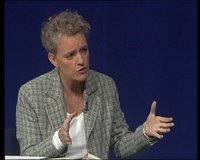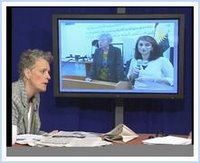Dutch journalist visits Roj TV
 Recently Dutch journalist Judit Neurink of the newspaper Trouw visited the Kurdish satellite TV-station Roj TV. She is working on a training program for journalists in South-Kurdistan. She has already visited South-Kurdistan and trained journalists of independent newspapers like Hawlati and newspapers tied to the Kurdish parties in Silemani and Hewler.
Recently Dutch journalist Judit Neurink of the newspaper Trouw visited the Kurdish satellite TV-station Roj TV. She is working on a training program for journalists in South-Kurdistan. She has already visited South-Kurdistan and trained journalists of independent newspapers like Hawlati and newspapers tied to the Kurdish parties in Silemani and Hewler.After her visit to ROJ TV she wrote an article for the newspaper Trouw which were published on 20.03.2006.
we publish the English translation here
"Kurd with an opinion calls to Denderleeuw" - Trouw
Kurdish satellite stations play a role in the strengthening national consciousness of Kurds. Not all authorities are happy with that.
"We are watched in all Kurdish regions and by Kurds in the Diaspora," says Hassan Ghazi, program director (presenter) on the Kurdish Tv-station Roj TV in Brussel. "Our message is that it's important, that different cultures live in peace together".
Ghazi is very proud of the TV-station. Turkey says that the TV-station has ties with the Kurdish separatist movement the PKK. "That's not true", he says. "We speak about tolerance, we do not have anything against Turkish culture and we have a lot of programs in Turkish."
 In the café in Flemish Denderleeuw, just outside the Belgium capital, there is not a lot of attention for the broadcasts of Roj TV in Turkish. Program directors are having a meeting, an announcer makes notes in his text.
In the café in Flemish Denderleeuw, just outside the Belgium capital, there is not a lot of attention for the broadcasts of Roj TV in Turkish. Program directors are having a meeting, an announcer makes notes in his text.Here two big studios are built for discussion-, interview- and child programs, sometimes with a public. On a separate section sits the newsreader with his back towards a busy editorial group.
Today guests are invited because of the deadly riots in the Kurdish Qamislo of two years ago. The channel spends a lot of attention to every subject that could be interesting for Kurds, says Ghazi. "There is a lot of room for discussions, and viewers can call and can talk and participate in the debates . That happens in three Kurdish dialects, Turkish and Arabic.
In Denderleeuw 120 Kurds work from diverse regions: from Iraq, Iran, Syria and Turkey (Kurdistan) and second generation Europeans. Ghazi emphasises that in Belgium, just as in Germany only production companies work for Roj TV and that the channel operates from Denmark. That's a smart construction, that should prevent a repeat of problems, that Med-TV and Medya-TV earlier had.
The Kurdish channels that operated from London and Paris were exposed to pressure of Turkey and broadcasting prohibition, because allegedly they were related to the PKK, an organization that's on the EU terror-list since 2004.
Turkish premier Erdogan asked the Danish government to close down Roj TV for the same reasons. The Danish premier Rasmussen has transferred the case for investigation to the police and public proscuter.
Roj TV is only one of the many satellite stations that focuses on the Kurds. In South-Kurdistan (North-Iraq) the Kurdish parties KDP and PUK have their own channels, which are also watched by Kurds in Turkey, Syria and Iran and in their programs they take account of this. Iranian-Kurdish opposition groups in South-Kurdistan recently set up two tv-stations, a third Iranian-Kurdish station will soon start broadcasting from Paris.
"Satellite television has a big influence on Kurdish identity and culture," says Hassan Ghazi. In Turkey, Syria and Iran Kurdish nationalism and consciousness is looked upon with suspicion, that's only grown by the rising of an autonomous Kurdish region in Iraq. In Syria even speaking the language is forbidden, in Turkey and Iran there are Kurdish newspapers, but they are controversial and face difficulties because of their political contents.
Satellite TV doesn't have to do with those restrictions. "We know that people with a satellite dish in Turkey and Iran record our programs and then watch the tapes in group."
"Save Roj TV" does what the EU is after
On Internet the channel is supported by the Save Roj TV Initiative:http:// rojtv.blogspot.com The chairman of Mesopotamia Broadcast and lawyer Henrik Winkel, denies Turkish allegations of ties with the PKK.
Other contributors on the website point to the fact, that the channel perfectly fits in the demands that the EU has for Turkey: that the Kurdish minority gets tv and radio in their own language. The website criticizes the way Turkey is doing this. Kurdish channels for instance must use subtitles to all programs and that makes live shows impossible. That's the power of foreign Kurdish channels: discussions where viewers can talk too.
Source: Trouw/Judit Neurink
Translated : by Vladimir van Wilgenburg


<< Home